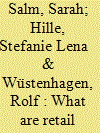|
|
|
Sort Order |
|
|
|
Items / Page
|
|
|
|
|
|
|
| Srl | Item |
| 1 |
ID:
166491


|
|
|
|
|
| Summary/Abstract |
The biomass-based heat entrepreneurships and heating cost reductions can generate long-term socioeconomic benefits on a local and regional economy. This analysis focuses on a small community, called Eno, located in predominantly rural region of North Karelia and demonstrate previously unknown socioeconomic impacts of energy cost reduction. We ask in this paper what type of long-term income and employment impacts heat entrepreneurship has from start-up to growth and maturity production stages. According to the socio-economic impact analyses, the total employment impacts of the Eno Energy Cooperative in 2000–2015 were approximately 160 FTE's and the total income impact in the same period was about 6.7 million euros. Results proved that besides to traditional socioeconomic impacts, the energy cost savings, and their induced impacts, can increase and even double the development benefits of bioenergy utilization. Previously known direct, indirect, and induced impacts of the investments and production are only a part of the socioeconomic impact of bioenergy production. These impacts are often analysed without understanding the profitability of bioenergy systems, and public and private benefits of reduced energy costs. This paper concludes with generic discussion on socio-economic impacts of bioenergy, which can be utilised in local policy advocacy.
|
|
|
|
|
|
|
|
|
|
|
|
|
|
|
|
| 2 |
ID:
150057


|
|
|
|
|
| Summary/Abstract |
Community energy has become an increasingly important issue in academia and in energy policy circles worldwide. Citizens jointly investing in and operating renewable energy installations have played an essential role in countries such as Germany or Denmark. Building on and extending previous studies, we collect survey data on investment motives for a stratified random sample of German community energy companies. Structural variables are selected using a socio-ecological-technical systems framework. This study aims to identify differences within the community energy sector to better understand investment behaviour and the effects of policy changes. Despite the small sample coverage at the individual member level, the preliminary results of this study suggest that, first, community energy forms a specific type of social investment and that, second, there are significant differences between community energy companies, especially regarding the assessment of the return motive. This motive plays a more prominent role in limited partnerships than in cooperatives and for community wind than for companies focusing on solar or biomass. While these and other factors are highly interrelated, our data indicate that the social setting and geographical and climatic conditions are the critical ones here. These findings may guide further research.
|
|
|
|
|
|
|
|
|
|
|
|
|
|
|
|
| 3 |
ID:
150061


|
|
|
|
|
| Summary/Abstract |
Citizens own nearly half the renewable energy generation capacity in Germany and have been important drivers of the country's energy transition. In contrast to citizens' important role in financing renewable energies, the energy policy and economics literature has traditionally focused on other investors, such as incumbent energy firms. To close this gap, this paper reports on a large-scale survey of 1,990 German retail investors. Conducting a choice experiment with the subset of 1,041 respondents who expressed an interest in investing in community renewable energy projects, we present a unique dataset allowing for new insights in risk-return expectations of retail investors. We find that apart from return on investment, respondents are particularly sensitive to the minimum holding period and the issuer of community renewable energy investment offerings. A minimum holding period of 10 years implies a risk premium of 2.76% points. A subsequent segmentation analysis shows that two groups of potential community renewable energy investors with different risk-return expectations can be identified: “local patriots” and “yield investors”. In contrast to professional investors, a majority of retail investors use simple decision rules such as calculating payback time or relying on their gut feeling when making investments.
|
|
|
|
|
|
|
|
|
|
|
|
|
|
|
|
|
|
|
|
|